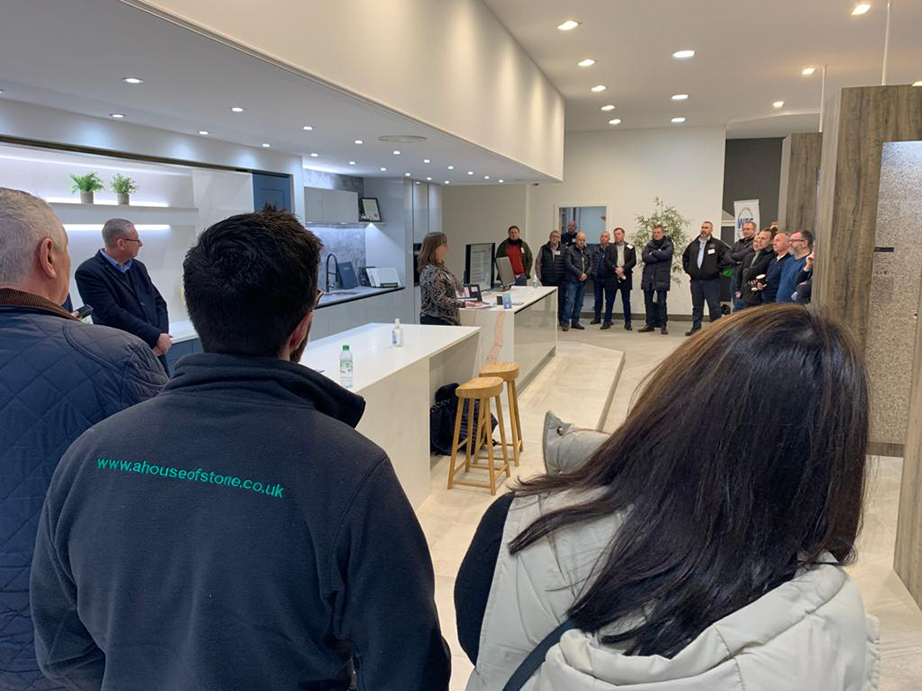With MPs of the All Party Paliamentary Group (APPG) for Respiratory Health having published their up-dated report on silicosis this month calling for a return to silicosis being a reportable industrial disease (read more about that here), the timing could not have been better for the Worktop Fabricators Federation (WFF) meeting concentrating on the control of dust, particularly respirable crystalline silica (RCS), on 23 January.
The meeting was held at the impressive premises of WFF member Granite Tops in Preston, Lancashire, where Brian Robertson and his team had put a lot of work into making the day such a success, including setting up a break-out room for a case-study from the company's specialist advisers who installed the Granite Tops at-station dust extraction system based on water-wash technology from the aerospace industry. Brian also scrambled his H&S consultant, Anjum Choudray, to provide roving free advice to the guests.
Another of the Parliamentary group’s recommendations to Parliament is that a feasibility study should be carried out by the Health & Safety Executive (HSE) into halving the RCS Workplace Exposure Limit (WEL) to 0.05mg/m3, which waves a warning flag over the worktop sector and was one of the reasons this was the WFF's best attended meeting yet (although a growing membership is another reason).
If the WEL is halved, it raises fresh challenges for professional fabricators – challenges that WFF members were able to discuss with industry experts at their meeting in Preston.
WFF General Secretary Chris Pateman says: "The sheer number of folks who travelled to Preston on a Monday morning says something about how seriously professional worktop fabricators take their responsibilities."
But the WFF is also concerned that halving the WEL opens up the whole question of how to legislate, and enforce legislation, for those who buy blanks and set up in their customers’ gardens with trestles, an angle-grinder and a pair of goggles.
As Chris Pateman says, it’s not clear from the APPG’s report that the MPs are even aware of this particular dynamic in the industry. He says that by its very nature this ‘spot exposure’ end of the market is almost impossible for HSE to monitor or police, and is another good reason for consumers, kitchen companies and designers to ensure the professionals of the WFF are making and fitting their worktops.
The MPs were also impressed by the Trolex Air XS real-time silica dust monitor launched last year, calling on the HSE to promote the idea of real-time dust monitoring with those who face exposure to it – and HSE says some 600,000 people in construction are exposed to RCS each year, making it second only to asbestos in terms of lung health risks in the industry.
Even before the British-made Trolex unit was launched, the WFF was given a preview of it from the manufacturer at one of the WFF meetings. At the January meeting members received an up-date from Simon Bradbury from Stone Industry Group (SiG), which is selling the machines to the stone industry. They are not cheap at about £10,000 each, but the WFF is exploring the idea of hiring units for the benefit of its members. Simon faced lots of people asking lots of questions in the light of the APPG report.
Natalie Tinsley, who leads on stone and glass dust for the HSE, brought the WFF members up to speed on the results of the HSE's dust enforcement campaign in the autumn and the HSE's subsequent actions on dust exposure.
Lastly, and perhaps a little peripherally, Kate Walker from the Diabetes Safety Organisation (DSO) launched WFF-branded support materials for the ‘one less’ campaign to raise awareness if diabetes. This was a follow-on to the incredibly well-received presentation Kate delivered at the WFF meeting in Warrington in September.
Everyone’s heard of diabetes, and some of those at the meeting on Monday put their hands up to having it or having a relative who does. But it’s not widely understood. So it’s one of those subjects that is more interesting to more people than you might expect.
The WFF interest in it initially came from the risks associated with somebody suddenly feinting while part of a four-man crew trying to carry a stone worktop up several flights of stairs. Since then, it seems to have developed something of a life of its own within WFF – another example of what comes out of best-practice sharing by people in the same trade.
All that and a curry for lunch (or an alternative for those who didn't want curry).

Simon Bradbury talking about the Trolex Air XS real-time silica monitor during the WFF meeting.

